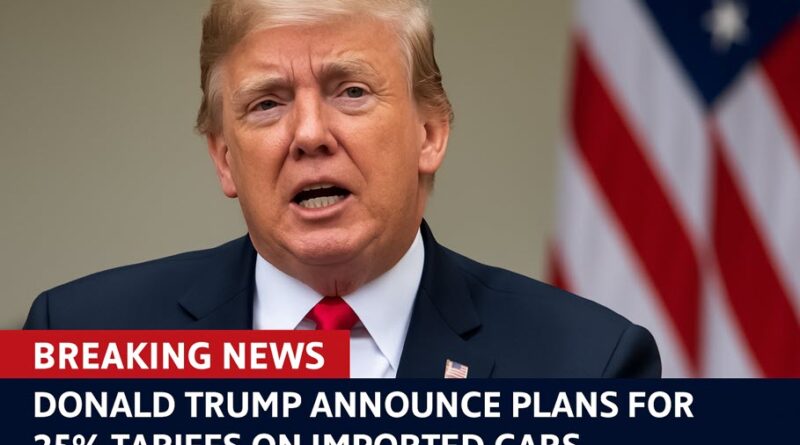Donald Trump Announces Plans for 25% Tariffs on Imported Cars
President Donald Trump recently stirred controversy again by proposing hefty 25% tariffs on imported cars if he returns to office. This announcement signals a return to Trump’s signature “America First” policies, which aim to boost domestic manufacturing but could also significantly impact consumers and automakers alike.
Here’s what Trump’s new car tariffs could mean—and why it’s making headlines in the auto industry.
Why Trump Wants New Car Tariffs
Trump argues that heavy tariffs on imported cars are necessary to protect American auto workers and strengthen U.S. manufacturing. He claims the measure would encourage foreign car companies to build more factories within the U.S., ultimately creating American jobs and supporting local economies.
Trump’s tariff proposals mirror policies from his previous presidency, when trade protectionism was a key part of his strategy to revitalize American industry.
Who Would Be Affected?
A tariff increase of 25% would immediately affect car manufacturers importing vehicles into the United States, including:
- European brands (BMW, Mercedes-Benz, Volkswagen, Volvo)
- Japanese brands (Toyota, Honda, Nissan, Subaru)
- Korean brands (Hyundai, Kia)
Even though many foreign automakers already operate U.S.-based factories, they still import many popular models. Tariffs could sharply increase prices on cars like the Toyota RAV4, Honda Civic, and BMW sedans.
How Much Could Car Prices Go Up?
A tariff of this size would likely result in noticeable price increases for consumers. For example:
- A $30,000 imported car would suddenly cost around $37,500.
- Luxury cars currently priced around $60,000 could see their price tags jump to $75,000 or more.
This potential price hike has consumer groups, dealerships, and automakers worried about declining car sales and affordability issues.
Wider Economic Impact
Economists and industry experts are concerned about broader economic consequences, including:
- Higher costs for consumers, making new cars less affordable.
- Retaliation from other countries, potentially hurting U.S. exports.
- Disrupted supply chains, increasing costs even for U.S. automakers who depend on imported parts.
- Potential job losses at dealerships and related industries if sales drop sharply.
Trump counters these arguments by claiming the tariffs will ultimately encourage more U.S. manufacturing and benefit American workers in the long run.
Automakers Respond to Trump’s Tariff Threat
Car companies have quickly reacted to Trump’s proposed tariffs, expressing deep concerns. Automakers like Toyota, BMW, and Volkswagen stress that they’ve already invested billions in U.S. plants and created thousands of American jobs. They argue tariffs would disrupt their operations, raise costs, and ultimately harm American consumers and workers.
Will the Tariffs Actually Happen?
Right now, Trump’s tariffs are just a proposal. If he regains the presidency, implementing tariffs of this magnitude would likely face strong legal challenges and pushback from Congress and international trading partners.
But even as a proposal, it sends a clear message to automakers and could influence their future investment decisions.
What’s Next?
Trump’s tariff announcement is a big story that could reshape the auto industry if implemented. While the policy remains hypothetical, the discussion itself will continue to impact automakers, dealers, and anyone planning to buy a new imported car.
Keep an eye out as this story develops, as it will likely remain a hot-button issue moving forward.
Buying a used VW. Buying used vauxhall, BMW, Jaguar, Ford, Volvo, Range rover, Bentley, Aston Martin, Porsche, Ferrari, Lamborghini, Maserati, Hyundai, Tesla, Honda, Pagani

